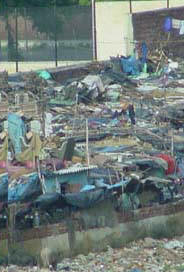|
As our month-long trip to the subcontinent wound its way down, we celebrated India's Independence Day. There were no fireworks nor was there the Boston Pops playing the "1812 Overture." However, in the absence of the noise created by our independence from the British, I had the opportunity to reflect upon India throwing off the yoke of British colonization. At best, the English rule was patronizing, and at its worst, it was grossly abusive of both the people and the resources of the subcontinent. The British Empire's rule finally ended due in large measure to the remarkable non-violent efforts of many under the leadership of Gandhi. One would have thought that once the Indians got rid of the English, they would rid their nation of all vestiges of things British. Not so. It is amazing and also troubling to see just how British India still is even as an independent nation. In addition to the Oxford inflexed English language, the military and police dress in British style uniforms down to the swagger sticks-used in colonial times to beat Indians into doing what the English wished. Our last two nights in India were spent in two of the finest hotels in the world. It was a nice way to wrap up an often-arduous trip with grossly primitive accommodations. These two hotels, one in Delhi and the other in Agra, were 5-star rated and started at over $300 per night (I might add that we got a deal on both these hotels. Being Scottish would never allow me even to consider spending that kind of money on a hotel room). We had stayed in some hotels that weren't even half-stars. We had gone from wrecks to the Ritz. While having breakfast in the Hotel Nikko in Delhi, I experienced another vestige of British rule. I started to write this article on my laptop. Pausing a moment to find the right word, I glanced up in a thoughtful way...as I often do. Two officious waiters beset me wanting to know what I needed. I had to say to them that I was just thinking. A frown came over the face of one of them realizing that he wouldn't be able to assist me in thinking. He shuffled off to light a cigarette of a wealthy German woman who was accompanied by two younger artsy travelers all of whom were really into this servant-master relationship and enjoyed it. All of the hotel employees were well dressed and clean as if ready for the review of a British sergeant major. The neatness surely instilled in them by the British went well beyond their personal dress. Everything needed to be neat and clean. During the breakfast, I received two white and immaculately starched and ironed napkins. In addition, the coffee that I ordered was poured with another napkin wrapped artistically around the pot. And still another napkin was tied around the creamer-just in case the waiter were to spill a drop of cream on the white and immaculately starched and ironed tablecloth. It seemed that the servers got a bonus for using more napkins. While still musing over the astronomical linen costs of the hotel, I opened a packet of sugar and poured the contents into my coffee. Without thinking, I discarded the envelope on the table. With the speed and accuracy of a smart bomb launched at an enemy came the waiter to dispose of the waste paper properly. Americans must surely seem Boorish to Indians. While the breakfast was delicious, I didn't savor my taste of Indian luxury very long. The average Indian makes $450 a year. One night at the Nikko with meals could cost more than the average yearly income of the Indian. What must the servers think when they leave work and return to their less than luxurious homes? Imagine waiting on wealthy Westerners-even I would be considered wealthy by their standards. As they leave the perfectly appointed hotel grounds and journey outside the affluent enclave, they must think about their lives in comparison to what they see at work. Do they resent kissing up to Westerners like the three artsy and affluent Germans? I can imagine what a server must think after working there for a year. By the end of my first week, I would have become a Marxist.
As my Indian friends celebrate their freedom, I wish them a most sincere greeting on their fifty-fourth year of independence. I'm happy that you are free of British rule, but I wish that you were freer than you seem. At any rate, my Indian friends, go boldly into your future and live as free men and women. This article appeared in the Dixon Telegraph on 11/27/01.
|
||||









